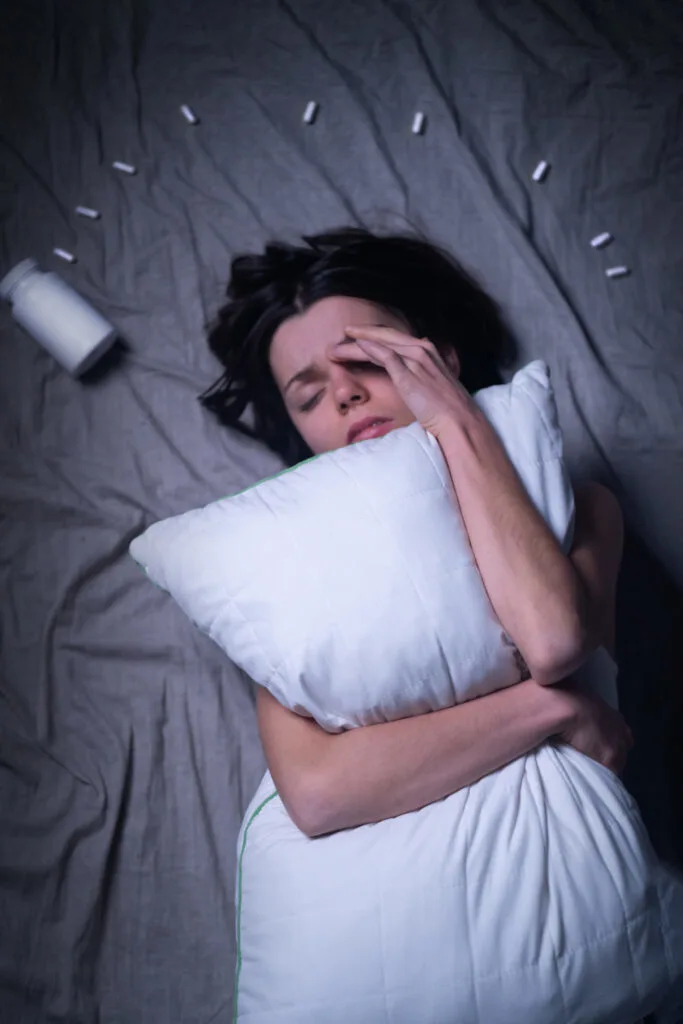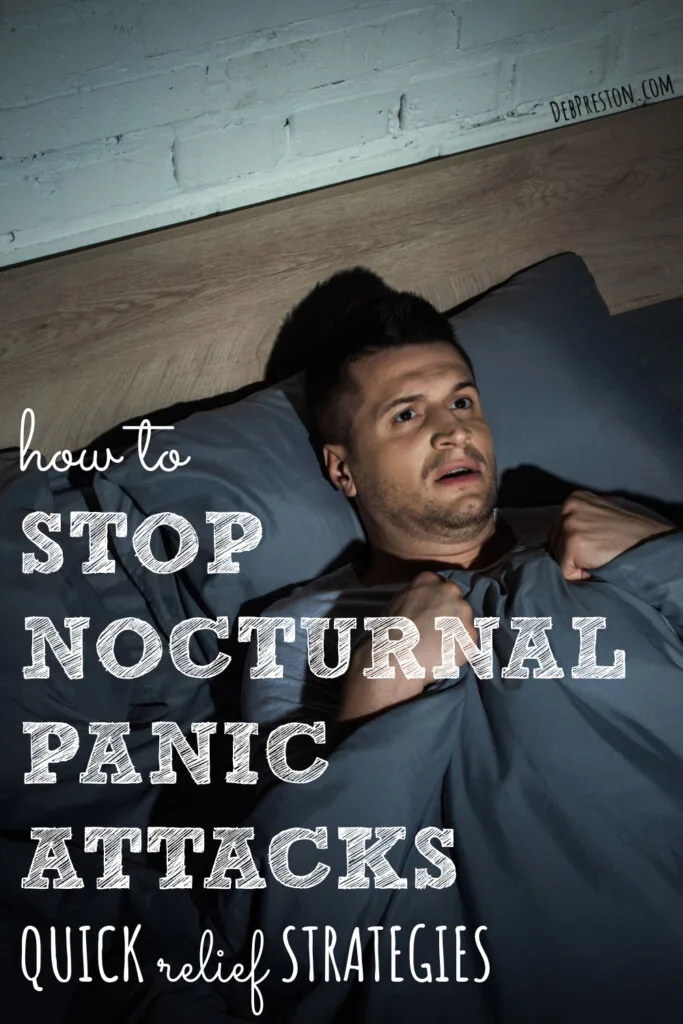Nocturnal panic attacks can be a confusing and frightening experience.
Unlike daytime panic attacks that occur while you’re awake, these attacks jolt you from your sleep, leaving you in a state of distress without any apparent trigger. The sudden surge of fear is often accompanied by an accelerated heartbeat, sweating, and shortness of breath.
By learning how to stop nocturnal panic attacks, you can take control and reduce the impact of panic attacks on your night-time rest. And the first step toward finding relief and restoring peaceful nights is understanding what nocturnal panic attacks are and recognizing their symptoms.

Understanding Nocturnal Panic Attacks
It’s important to be able to understand what these attacks are, recognize their symptoms, and identify possible causes. This knowledge is a crucial step toward managing and eventually stopping them.
Defining Nocturnal Panic Attacks
Nocturnal panic attacks are episodes of intense fear that awaken you from sleep. Unlike nightmares, these attacks cause actual physical responses, such as sweating and a racing heart, and occur in the absence of a dream.
Symptoms of Nocturnal Panic Attacks
When experiencing a nocturnal attack, you might face:
- Sudden awakening: feeling terror-stricken out of your sleep.
- Psychological distress: intense fear or a sensation of doom, even if there is no clear danger.
- Physical reactions: sweating, trembling, and a heart racing uncontrollably.
- Breathing difficulties: shortness of breath or a feeling of choking.
Causes and Risk Factors
Contributors to nocturnal panic attacks may include:
- Stress: Daily tensions can accumulate and manifest as panic attacks during sleep.
- Anxiety and panic disorder: If you already deal with these conditions, your chances of experiencing nighttime panic attacks may be higher.
- Genetics: A family history of a panic disorder can increase your risk.
- Brain chemistry: Imbalances here can contribute to unexpected panic attacks.
Understanding these factors can guide you toward addressing nocturnal panic attacks more effectively.

Impact on Health and Sleep
Experiencing nighttime panic attacks can disturb your sleep patterns and potentially have long-term effects on both your physical and mental well-being.
Connection Between Sleep Disorders and Panic Attacks
Nocturnal panic attacks are often associated with various sleep disorders, such as insomnia and obstructive sleep apnea. If you’re struggling with a sleep disorder, you may be more prone to experiencing panic attacks during the night.
These attacks can interrupt your sleep cycle, leading to sleep deprivation and a greater sense of restlessness. It’s important to consult a mental health professional if you notice a recurring pattern of anxiety symptoms manifesting during sleep.
Effects on Mental and Physical Health
The repercussions of disrupted sleep due to nocturnal attacks extend beyond just feeling tired. Chronic sleep interruptions can affect your mental health, increasing the risk of conditions like depression and anxiety disorders.
From a physical standpoint, poor sleep quality is linked to a wide range of issues, including heightened blood pressure and a weakened immune system. For these reasons, it’s crucial to address these anxiety symptoms for the sake of your overall health and well-being.

How to Stop Nocturnal Panic Attacks
Experiencing a nocturnal panic attack can feel distressing, but there are lots of effective strategies out there to reduce their frequency and intensity. Let’s explore specific methods you can implement to regain control over your sleep and well-being.
Relaxation Techniques and Breathing Exercises
Deep Breathing: When panic strikes, breathe slowly and deeply.
Inhale through your nose for a count of four, hold for two, and exhale through your mouth for six. Focus purely on your breath as this can help slow your heart rate and ease other symptoms.
Meditation and Yoga: Incorporate meditation or yoga into your daily routine.
These practices promote relaxation and have been shown to reduce stress levels. Even a few minutes a day can make a significant difference in your overall mood and ability to cope with stress at night.
Diet and Exercise Considerations
Limit Caffeine: Be mindful of your caffeine intake, as it can exacerbate anxiety and disrupt sleep. Try to avoid caffeine several hours before bedtime to help ensure it doesn’t keep you awake or contribute to nighttime panic attacks.
Regular Exercise: Engage in regular physical activity.
Exercise has been proven to improve mental health by reducing symptoms of anxiety disorders and depression. Aim for at least 30 minutes of moderate exercise most days, but not too close to bedtime, as this can increase your energy levels before sleep.
Bedtime Routines and Sleep Environment
Establish a Calming Bedtime Routine: Create a bedtime ritual that signals to your body it’s time to wind down. This might include reading, taking a warm bath, or listening to soothing music.
Optimize Your Sleep Environment: Keep your bedroom quiet, cool, and comfortable.
Reduce disturbances by using blackout curtains, eye shades, earplugs, or white noise machines if necessary. A serene environment can improve the quality of your sleep and reduce the likelihood of panic attacks.
By integrating these practical tips into your life, you can improve your management of nighttime panic attacks and enhance the quality of your rest. If your panic attacks persist, seek help from a mental health professional who can provide tailored advice and support.
Treating Nocturnal Panic Attacks
Nocturnal panic attacks can feel unsettling, but with the right treatment strategies, you can reduce or prevent their occurrence. Effective treatment usually involves a combination of medical interventions, therapeutic approaches, and lifestyle adjustments tailored to your specific needs.
Medical Treatments and Medications
Your doctor may recommend medication to help manage the symptoms of nocturnal panic attacks. Common medications include:
- Antidepressants: These can help regulate neurotransmitters that affect emotion and stress.
- Benzodiazepines: Used sparingly for acute relief, they can reduce the intensity of an attack if taken at bedtime.
Therapy and Mental Health Care
Engaging with a mental health professional can prove to be a critical step in managing nighttime panic attacks:
- Cognitive Behavioral Therapy (CBT): This type of therapy teaches you to recognize and change thought patterns and behaviors that trigger both nighttime and daytime panic attacks.
- Psychotherapy: Talking with a therapist can provide you with strategies to handle anxiety and prevent attacks.
Lifestyle Changes and Self-Care
Making certain lifestyle changes can also significantly help in treating nocturnal panic attacks:
- Relaxation techniques: Incorporate practices such as deep breathing exercises or progressive muscle relaxation into your bedtime routine.
- Sleep hygiene: Stick to a consistent sleep schedule and create a restful environment in your bedroom.
Remember, it’s important to work with your healthcare provider to develop a comprehensive treatment plan that’s best for you.

How to Stop Nocturnal Panic Attacks Through Prevention Strategies
To effectively prevent nocturnal attacks, it’s essential to understand the various strategies that can reduce their occurrence. By actively managing your stress and triggers, building a robust support system, and adopting a comprehensive long-term approach, you can minimize the impact of these incidents on your life.
Identifying and Managing Triggers
Stress is often a significant trigger for nighttime panic attacks. By identifying the sources of stress in your day-to-day life, you can take proactive steps to reduce its influence.
Create a treatment plan that includes stress-reduction techniques like deep breathing, mindfulness, and other relaxation practices. Keep a journal to track and connect your stress levels to potential triggers that may lead to an attack at night.
- Practice deep breathing: Inhale deeply for a count of four, hold for four, exhale for four, and repeat.
- Incorporate mindfulness meditation: Dedicate a few minutes each day to sit quietly and focus on your breath.
Building a Support System
One of the cornerstones of preventing nocturnal panic attacks is having a solid support system.
Talk to your family, friends, or a mental health professional about your experiences. They can offer emotional support and practical advice that can help you navigate through stressful situations or significant life events that may contribute to your panic attacks.
- Reach out regularly to friends or family who understand what you’re going through.
- Consider joining a support group where you can connect with others experiencing similar challenges.
Long-term Management and Prognosis
Learning how to stop nocturnal panic attacks long-term involves a commitment to a comprehensive treatment plan that includes both medical and therapeutic interventions, as well as lifestyle modifications.
Engage in regular physical activity, maintain a healthy diet, and ensure a consistent sleep schedule. Techniques such as cognitive behavior therapy (CBT) have been proven effective and may offer lasting relief when practiced consistently over time.
- Establish a regular sleep routine to improve sleep quality and reduce nighttime anxiety.
- Explore therapeutic options like CBT to learn coping strategies and reduce the likelihood of panic attacks.

Frequently Asked Questions About How to Stop Nocturnal Panic Attacks
In this section, you’ll find targeted advice on how to stop nocturnal panic attacks, including the use of techniques for prevention, the role of therapy, and practical steps for calming night-time anxiety.
What techniques can help prevent panic attacks during sleep?
Practicing relaxation techniques before bed, such as deep breathing exercises or progressive muscle relaxation, can reduce the likelihood of panic attacks during sleep. Establishing a calming bedtime routine and creating a sleep environment that promotes relaxation are also beneficial.
What is the role of Cognitive Behavioral Therapy in managing nocturnal panic attacks?
Cognitive Behavioral Therapy (CBT) is effective in identifying and changing the thought patterns that contribute to panic attacks. Through CBT, you can learn coping strategies that specifically target and reduce the frequency of both nocturnal and daytime panic attacks.
Can nocturnal panic attacks pose a serious health risk, and how can one mitigate it?
While nocturnal panic attacks themselves are not typically harmful, the stress and fear they generate can adversely affect your sleep quality and overall health. Maintaining a regular sleep schedule and reducing stress through healthy habits like exercise can mitigate this risk.
Why might someone experience increased anxiety when falling asleep, and how can this be addressed?
Anxiety when falling asleep may be due to stress, unresolved worries, or poor sleep habits. You can address this by ensuring your sleep space is comfortable and reserved for sleep only, and by writing down concerns before bed to clear your mind.
How can one calm their anxiety upon waking in the middle of the night?
If you wake up anxious, focus on slow, deep breaths and mindfulness exercises to ground yourself in the present moment. Techniques like visualization or gently guiding your attention back to sleep can also be helpful.
Are there specific triggers that cause panic attacks while sleeping, and how can they be identified?
Yes, certain triggers like stress, anxiety disorders, or sleep disorders can lead to nocturnal panic attacks. Keeping a sleep diary can help identify these triggers and establish patterns, which can then be addressed with lifestyle changes or professional help.
How can I tell if my chest pain is caused by a nocturnal panic attack or a heart attack?
Distinguishing between chest pain caused by a nocturnal panic attack and a heart attack can be challenging, as both conditions can produce similar symptoms. However, there are some differences that may help differentiate between the two:
During a nocturnal panic attack, chest pain is typically sharp or stabbing and localized in the middle of the chest. Panic attacks are also associated with other symptoms such as a sense of impending doom, intense fear, sweating, rapid heart rate, trembling, shortness of breath, and feeling lightheaded or dizzy (Medical News Today).
In contrast, chest pain from a heart attack may be perceived as pressure, fullness, or a squeezing sensation in the chest that can radiate to other areas like the arm, jaw, or back.
Heart attacks can also cause symptoms like nausea, cold sweat, and shortness of breath. The pain or discomfort from a heart attack is usually more persistent and does not subside quickly (BIDMC of Boston).
It’s important to note that both conditions require immediate medical attention. If you experience chest pain and you’re unsure of the cause, it’s crucial to seek emergency medical care immediately, as a heart attack is a life-threatening emergency.
It’s better to be cautious and get evaluated by healthcare professionals who can provide an accurate diagnosis and appropriate treatment.
What’s the difference between noctural panic attacks and night terrors?
Nocturnal panic attacks and night terrors are both sleep disturbances that can cause a person to wake up suddenly, but they have distinct differences.
Nocturnal panic attacks, also known as nighttime panic attacks, occur during sleep without an obvious trigger and can awaken an individual from sleep.
Those who experience nocturnal panic attacks may have symptoms similar to daytime panic attacks, such as sweating, chest pain, palpitations, and a feeling of intense fear or a sense of impending doom. Unlike night terrors, individuals usually have a clear memory of the panic attack after they wake up (Mayo Clinic).
On the other hand, night terrors, also known as sleep terrors, are characterized by intense fear, screaming, flailing, and sometimes sleepwalking. They are more common in children than in adults.
During a night terror, a person is not fully awake and often has no recollection of the event after they fully awaken. Night terrors tend to occur during non-REM sleep, typically in the earlier part of the night.
In summary, the key differences between nocturnal panic attacks and night terrors include the level of awareness and recall of the event, with nocturnal panic attacks being remembered upon waking and night terrors typically not being remembered. Additionally, the behaviors exhibited during the events differ, with panic attacks presenting with symptoms similar to daytime panic and night terrors involving more intense physical or vocal reactions without full consciousness.

P.S. Is worry taking over your life? Nab our free workbook to create a personalized worry management plan, and start lowering your anxiety today! Get yours HERE.
Disclosure: While all opinions are our own, we are a participant in the Amazon Services LLC Associates Program and other affiliate advertising programs, designed to provide a means for us to earn fees by linking to Amazon.com and affiliated sites, at no additional cost to you.



